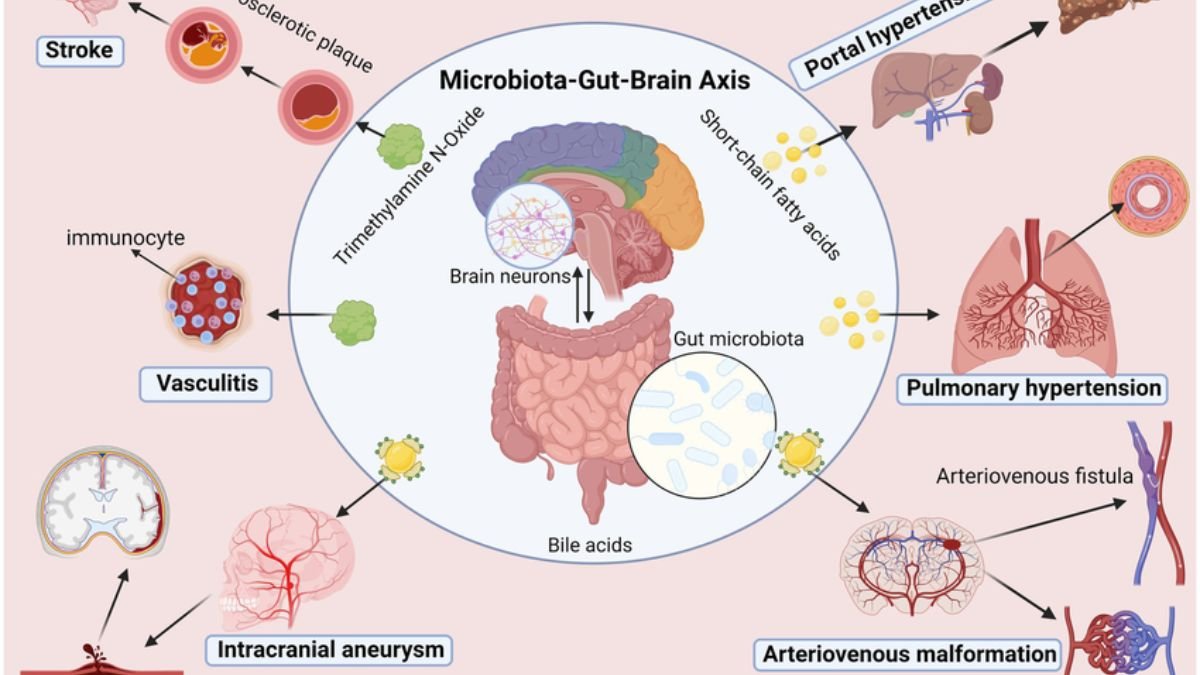We have all heard the saying – “As you eat, so will be your mind.” This is not just a saying but modern science is also confirming that there is a deep connection between our stomach and brain. In scientific language, it is called gut-brain axis. Research in recent years has shown that the trillions of bacteria present in our body, collectively called microbiome, have a profound effect not only on our digestion but also on our mood, stress level and mental health.
In this article, we will understand in detail what is gut-brain axis, how microbiome plays a role in mental health, and how recent research is revolutionizing the direction of new treatments for mental diseases.
What is gut-brain axis?
The gut-brain axis is a two-way communication system through which our stomach (gut) and brain (brain) are constantly connected to each other. This connection works in three main ways:
- Neurological pathway – Direct connection between the gut and the brain via the vagus nerve.
- Immune system – Substances produced by the microbiome affect our immunity and mental stability.
- Biochemical signals – Neurotransmitters (such as serotonin, dopamine, GABA) produced by the gut microbiome regulate brain activity.
In other words, the gut does not just digest food, but it acts as a ‘second brain’ for the brain.
What is the microbiome and why is it so important?
About 100 trillion microorganisms live in the human gut. These include bacteria, fungi and viruses. These are collectively called the gut microbiome.
Their role is not limited to just digestion, but –
- They produce vitamins and essential nutrients.
- They protect the body from harmful bacteria.
- Maintains the balance of hormones and neurotransmitters.
Research has shown that about 90% of serotonin (called the happy hormone) is produced by the gut microbiome. That is, our mood and emotional state directly depend on the health of our intestines.
Effect of gut microbiome on mental health
Studies conducted in the last decade have proved that imbalance in the gut microbiome (dysbiosis) can cause many mental health problems.
- Depression – People who have less beneficial bacteria in their gut microbiome are at higher risk of depression.
- Anxiety – Imbalance of the gut microbiome increases cortisol (stress hormone), which increases anxiety and stress.
- Autism and neurological disorders – Disturbance of the microbiome in children has been linked to autism spectrum disorder.
- Sleep problems – Gut bacteria also affect the melatonin hormone that regulates sleep.
Recent research and achievements
Science has made several important discoveries in the understanding of the gut-brain axis:
- Probiotics therapy: Scientists have found that intake of certain probiotic bacteria such as Lactobacillus and Bifidobacterium reduces mental stress and anxiety.
- Fecal microbiota transplant (FMT): This technique is being used to balance the gut microbiome and initial results are promising in mental health improvement.
- Diet and nutrition based therapy: High fiber and prebiotic rich foods such as yogurt, kefir, pickles, whole grains are proving to be helpful in improving mental health.
Future direction
The dependence on medicines alone in the treatment of mental diseases is now decreasing. Researchers believe that in the coming years:
- There will be personalized microbiome testing, which will create customized diet and probiotic therapy for every individual.
- New biotherapeutics will develop that treat mental illnesses by balancing gut bacteria rather than drugs.
- Digital health tools such as apps and wearables will be helpful in tracking gut-brain health and improving mental health.
Gut-brain health in the Indian context
In a country like India, where Ayurveda and traditional medicine have linked diet and digestion to mental health, scientific confirmation of the gut-brain axis holds special significance.
- The Indian diet already includes fermented foods such as curd, pickles, idli, dhokla, which are rich in probiotics.
- Practices such as yoga and meditation also strengthen the gut-brain connection as they regulate stress hormones.
Thus, India has the potential to provide a holistic solution in the mental health sector by combining traditional knowledge and modern science.
Steps to adopt in daily life
It is very important to take care of gut health to improve mental health. For this:
- Take a balanced diet – include fiber and probiotics in the diet.
- Manage stress – do yoga, meditation, and get enough sleep.
- Reduce processed food and junk food – these harm the gut microbiome.
- Do regular physical activity – exercise improves gut health.
Conclusion
Research on the gut-brain axis and microbiome confirms the fact that mental health is not just a matter of the mind but of the whole body. A healthy gut means a healthy mind. In the future, gut microbiome-based treatments will give a new direction to the treatment of mental diseases.
